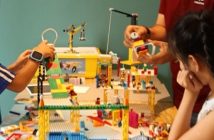 “Oh no,” the optician said gravely as he shined his light into the eyes of my three-year-old daughter Elin, “This is not what we want to see.” Two minutes earlier I’d been trying to assure him that Elin did, in fact, know her alphabet and that I couldn’t understand why she’d not been able to identify all but the largest of the letters at the summit of the eye test chart. Two days later we were back at his practice in my hometown of Cardiff in the UK, picking up a pair of glasses with a prescription in one eye of +950.
“Oh no,” the optician said gravely as he shined his light into the eyes of my three-year-old daughter Elin, “This is not what we want to see.” Two minutes earlier I’d been trying to assure him that Elin did, in fact, know her alphabet and that I couldn’t understand why she’d not been able to identify all but the largest of the letters at the summit of the eye test chart. Two days later we were back at his practice in my hometown of Cardiff in the UK, picking up a pair of glasses with a prescription in one eye of +950.
Upon being told of the degree of Elin’s long-sightedness, I felt I must have done something wrong as a parent. How could I not have noticed? To put things in context, my father has a prescription almost twice as “good” as Elin’s. Yet, without his glasses, he becomes as unaware of his surroundings as a Beijing taxi driver driving at the end of a fourteen-hour shift.
Later, an eye specialist told me that before the age of six, children’s eyes can do a lot to accommodate. It was for this reason that Elin wasn’t holding her little books at arms length or backing away from the TV as one might expect. He went on to say that she should have been to an optician earlier, but her eyes would improve. At this point, I churned out the line that we are all too quick to utter, about not trusting the Chinese medical system and had therefore waited to return home in the summer. The doctor smiled and responded that young doctors from the UK hospital were presently in rural China, administering training on the same types of issues to local village health workers!
The next course of action to be considered in a few months time was putting a patch over her eye if the weaker eye doesn’t strengthen enough. Despite the fact that Elin’s little orbs had been working overtime to help her view of the world to be less mirage than that of a Monet, she is now seeing things a lot more clearly.
The first thing that she said upon seeing my father one evening was, “Yeye, you have a very fat head!” Aside from noting the odd dimensions of my relatives, she’s much more inclined to sit and look at a book as she’s being read to. At the same time, we’ve realized that what we thought was a lack of coordination was in fact, the defective genes she inherited from her father’s side.
All of this has left me feeling slightly guilty that I’d waited nearly six months to take her back to the UK for treatment that could have been done at a local health clinic. All I needed to have done was to do a quick Google search, to find one of several hospitals in Beijing that specialize in eye care. I’ve promised myself that I’ll open my eyes to what’s closer to home, so that I don’t feel the premature need to return home in the future!
Gareth Jones has lived in China for five years and teaches English, Theory of Knowledge and Thinking Skills at YCIS Beijing. When he’s not teaching, he spends his time trying to keep up with his two daughters. Gareth also runs a small health and development charity, find out more at www.hand.org.cn
This article is excerpted from beijingkids October 2011 issue. View it in PDF form here or contact distribution@beijing-kids.com to find out where you can pick up your free copy.



